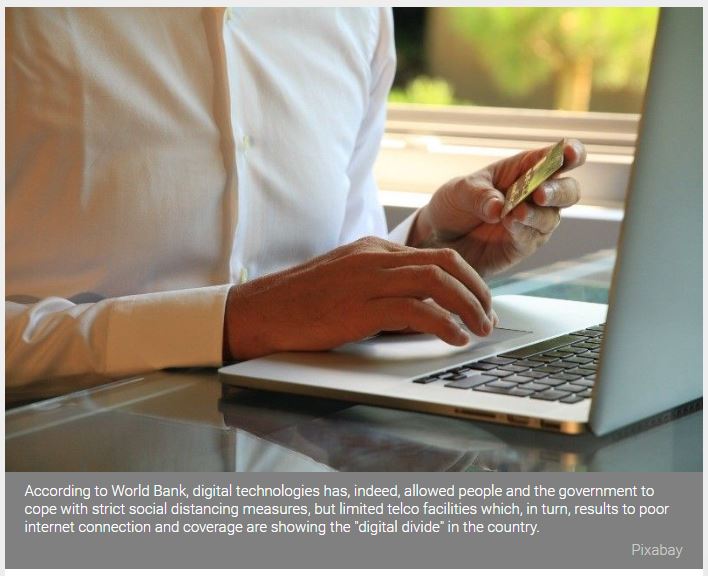Government roadblocks make Philippines internet slow and expensive
MANILA, Philippines — Regulatory impediments are hampering the Philippines’ digital shift, raising internet costs even as network speed has not caught up with rest of Southeast Asia despite a welcome boost from movement restrictions brought by the pandemic.
In a joint report with the National Economic and Development Authority, the World Bank said that while “digitalization momentum has accelerated” in the country amid lockdowns, “weak digital infrastructure in the country is hampering the effective use of digital technologies.”
Citing third-party data, the multilateral lender said the Philippines has a disproportionate number of people still relying on 3G, while countries like Indonesia, Thailand , Malaysia and China have seen their populations connected through a faster 4G network.
Despite a notoriously slow connection, Manila also has the most expensive internet in the region.
“The relatively poor performance in digital adoption can be traced to a multitude of factors including the high cost and uneven quality of internet, limited adoption of digital payments, expensive logistics and a business environment with low levels of competition,” the report said.
Government policies are to blame. Apart from lack of foreign competition that left existing providers complacent, bureaucratic red tape in securing numerous licenses to build network towers have slowed digital expansion. While President Rodrigo Duterte had since ordered to accelerate permitting, requiring congressional franchises for new players optimally “disincentivizes” competition.
Online shopping may have also boomed from consumers too afraid to go out, but World Bank said shipping of orders have likewise been slowed by “complicated” customs procedures. This, in turn, increases logistics costs for firms which are then passed on to consumers.
For cashless payments, a lack of national ID system also meant difficulty in identifying clients. Banks have also been hesitant to join the central bank’s Instapay and PESONet platform that allows interbank transfers despite the service being operational for years.
Telco firms promise better connection
“The ability of the private sector to be part of the digital economy requires a conducive and competitive business environment,” World Bank said.
“Market leaders have little incentive to invest in technologies new to the firm since they do not face competitive pressures to reduce their costs— while laggard firms are too far away from the frontier to bridge the cost gaps and enter the market,” it explained.
For their part, existing telco players vowed to continuously improve their services. “We expect to continue with the investments because of the increasing demand for or services,” Ernest Cu, Globe Telecom Inc. president and chief executive, said in a separate statement.
For his part, Alfredo Panlilio, president and chief executive at Smart Communications, said last Friday the company has noticed an acceleration in the issuance of permits for construction of telco towers, even from local governments, since Duterte ordered that their release be fast tracked. PLDT Inc., which owns Smart, said project rollout will be ramped up.
“Complementing the towers is an extensive fiber optic network which we currently have of at least 360,000 kilometers. We continuously expand our fiber network, and will be applying for permits to build more…,” Panlilio said in a statement.
Digital taxation a regional thing
To be fair, some observations by World Bank are in the process of getting resolved. For instance, the government is finally rolling out the national ID program on October 12, while as World Bank cited, a common tower policy that removes the responsibility of building towers from telco firms to specific tower contractors is already in effect. That said, reforms had been slow in materializing.
Another long-term fix the government can do is for the entire bureaucracy to pioneer the digital shift, which in turn should prompt the rest of the economy to do the same.
Congress is also working on a digital transactions tax that already passed a Lower House committee last July. Kevin Chua, World Bank economist and lead author of the report, said the proposed 12% sales levy is not exactly bad news for the Philippines with its neighbors also moving toward that direction.
“The idea of digital taxation especially in the case of the Philippines is we want a level playing field especially for those local sellers and also foreign sellers,” Chua said in a briefing after the release of report.
“We have many things to consider here especially we’re going to the election period so the key here is this should be on our radar knowing that many other countries are also working on the digital taxation,” he added.
Source: https://www.philstar.com/business/2020/10/05/2047345/government-roadblocks-make-philippines-internet-slow-and-expensive


 English
English




